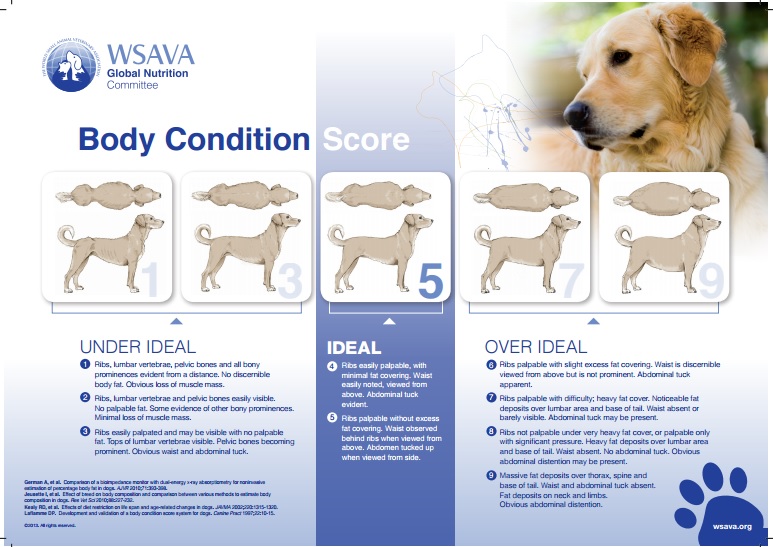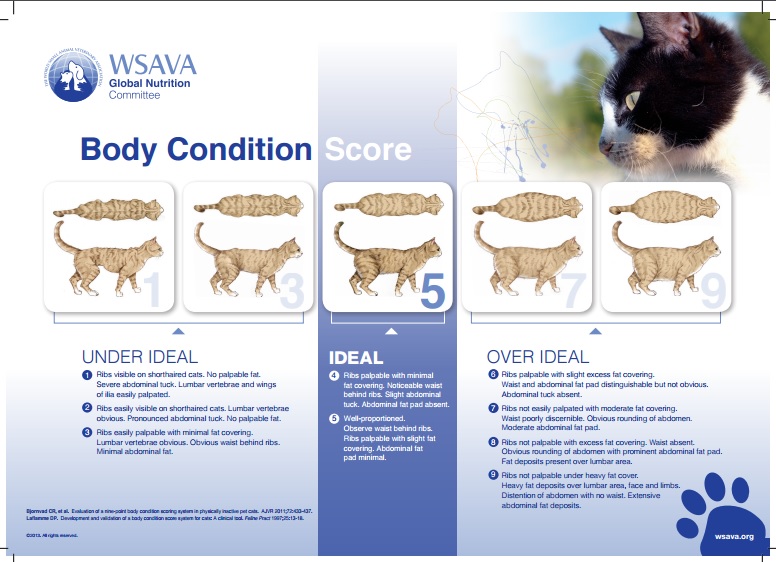Many pet owners become aware of their own body goals during January, but what about our pets? Are you familiar with what is the ideal body weight for your specific pet? We so often see memes of overweight pets or ASPCA commercials with with severely malnourished pets that it may skew your ideas on what is an appropriate, healthy weight. While a target weight varies greatly from pet to pet, here’s a basic chart that briefly explains “body condition score” for cats and dogs!
So what’s the big deal if your pet isn’t in a #5 category? Here in the United States, a survey conducted by the Association for Pet Obesity Prevention (APOP) found 52.5% of dogs and 58.3% of cats to be overweight or obese by their veterinarian and those numbers have the potential to rise even further. The health repercussions of obesity in our pets can be very damaging and even fatal, so here’s a list of just a few of the diseases and conditions that can come from your pet’s extra weight.
- Decrease in energy and stamina: If your pet is overweight, it will take a lot more energy for them to get up and move around.
- Hypertension: Commonly called high blood pressure, hypertension can lead to eye damage, heart and kidney problems, increased risk of bleeding, thyroid disorders, and even neurological issues.
- Diabetes: That’s right, your cat or dog can get diabetes too. Diabetes is not only potentially fatal, it is also much more difficult to maintain treatment in your cat or dog than it is your Uncle Joe.
- Heat intolerance: That extra body weight insulates your pet even during the hot summer months. This can create an increased risk of heat stroke–another common pet killer.
- Labored breathing and other respiratory problems: This results from a combination of factors as a result of obesity. The extra weight requires more energy to move and the heat intolerance drives dogs to pant more as to release that excess heat.
- Arthritis: Carrying those extra pounds around can do some damage to your pet’s joints, causing them to become inflamed and irritated. Not only will this make it even more difficult for your pet to move around, but it can also be very painful.
- Increased risk during surgery: If your pet needs a surgical procedure done and is over weight, it may complicate the anesthesia. The excess body mass skews the amount of sedatives needed to keep your pet anesthetized for the procedure.
- Increased risk of various cancers: You read that right. Being overweight can increase your pet’s chances of developing cancer, especially malignant tumors that are potentially fatal.
These are just a few of the health problems that may develop from giving your those extra treats and skipping out on the designated play time. Here at Emerald Animal Hospital, to help you get your pet’s weight back under control, we’re offering FREE MEASURING CUP & WEIGHT ASSESSMENT with one of our technicians. We will weigh and measure your pet to develop an individual feeding guide and exercise program. If we determine your pet needs a prescription weight loss diet, you will RECEIVE 10% OFF in the month of January. We hope that 2017 is the healthiest year for you and your pet yet, so give us a call at 216-749-7161 to set up your appointment!



